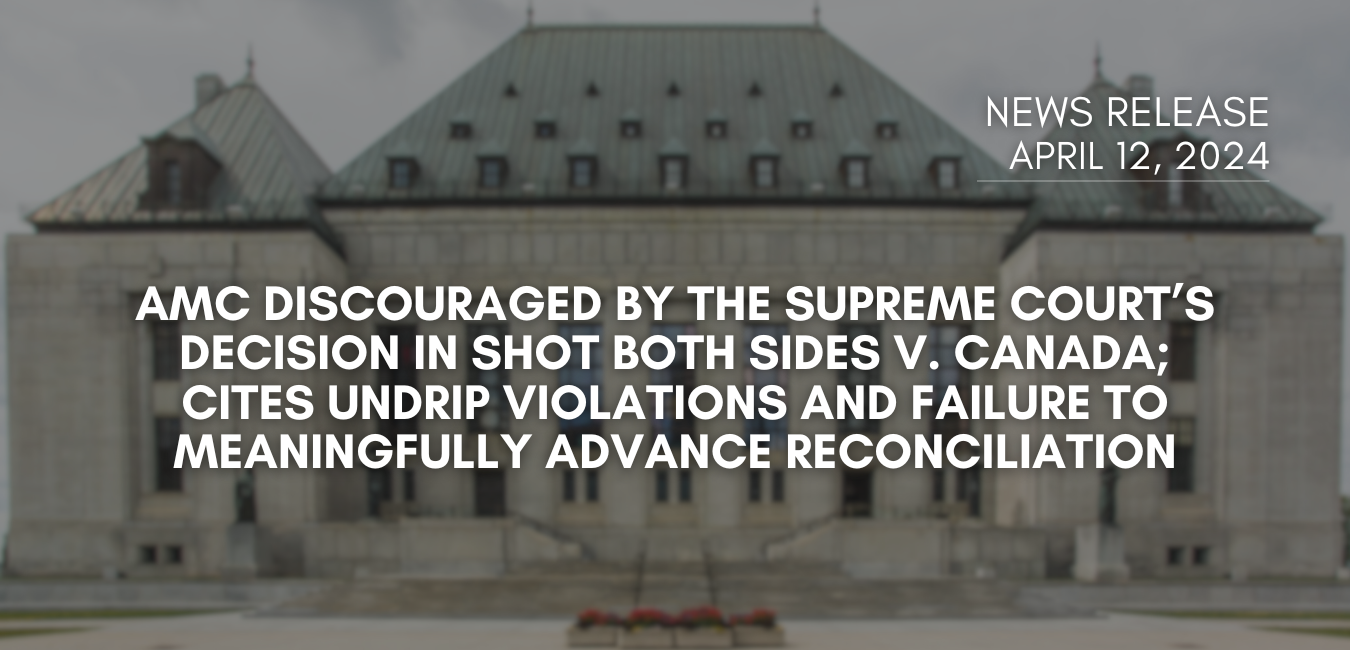AMC Discouraged by the Supreme Court’s Decision in Shot Both Sides v. Canada; Cites UNDRIP Violations and Failure to Meaningfully Advance Reconciliation

April 12, 2024
Treaty One Territory, Manitoba
AMC Communications
Treaty One Territory, Manitoba – The Assembly of Manitoba Chiefs (AMC) issues this response to today’s Supreme Court of Canada’s decision in Shot Both Sides v. Canada.
In this case, the Kainai Nation commenced an action against Canada for failing to set aside reserve lands that were promised under Treaty 7. The claim was started after the expiration of the limitation period in Alberta, but the Federal Court determined that the claim could continue because Treaty rights could not be enforced until the enactment of s. 35 of the Constitution Act, 1982. The Federal Court of Appeal reversed the decision, finding that Canada’s obligations to fulfill Treaty promises existed before the enactment of s. 35. The Kainai Nation then appealed the decision to the Supreme Court.
Today, the Supreme Court of Canada upheld the Federal Court of Appeal’s finding that the enactment of s. 35 did not impact the limitation period. The Supreme Court ruled that Treaty obligations are enforceable and actionable from their execution and that s. 35(1) is “not the source of Treaty rights”. The result is that the limitation period unilaterally imposed by the province of Alberta is effective to bar the Kainai Nation’s claim.
Unfortunately, this means the only enforceable judgement the Kainai Nation can seek to for compensation for their stolen land is at the Specific Claims Tribunal, which significantly limits the remedies they can seek through judicial or quasi-judicial means. While the Tribunal can address claims that are barred by statutes of limitations, compensation is capped at $150 million and the Tribunal cannot award punitive or exemplary damages, damages for cultural loss, or order the return of land. Due to Canada’s breach of Treaty, the Kainai Nation is owed 162.5 square miles of reserve land from the time it entered into Treaty 7 in 1877. The lack of judicial remedies available to the First Nation is, therefore, immensely troubling.
The AMC participated as an intervener in the case, arguing that the Crown’s reliance on the statute of limitations is inconsistent with the Nation-to-Nation Treaty relationship, United Nations Declaration on the Rights of Indigenous Peoples (UNDRIP), and perpetuates breaches of Treaty. The AMC argued that it is no longer justifiable to maintain colonial laws such as statutes of limitations, which were founded without the input of First Nations and used to their detriment. The AMC asked the Supreme Court to reject narrow interpretations of the law that are contrary to reconciliation in favour of legal interpretations that strengthen and uphold the Treaty relationship and meaningfully advance reconciliation.
The Supreme Court determined that reconciliation in this case could be fostered by declaratory relief. Declaratory relief is a discretionary remedy that cannot be enforced in courts and instead assumes that the Crown will act honourably in implementing its obligations. However, the declaration the Supreme Court granted in no way guarantees a just remedy, “[a] clear statement setting out the Crown’s infringement of an Indigenous party’s rights may spur reconciliation efforts between the parties to address the wrongs suffered [emphasis added].”
In response, Grand Chief Cathy Merrick noted that Canada’s history of dishonourable conduct towards First Nations makes it evident that without courts meaningfully compelling the Crown to act honourably, First Nations cannot expect to be treated fairly. She stated, “Declaratory relief affords too much deference to the Crown, the same entity that has historically and continually acted against First Nations interests. On the one hand, the Supreme Court recognized Canada’s conduct in breaching Treaty 7 was “deplorable,” but on the other, it forces the Kainai Nation to rely on Canada’s goodwill to negotiate a remedy that can even come close to addressing the First Nation’s loss.”
“This case provided a significant opportunity for the Supreme Court to meaningfully advance reconciliation by making clear that statutes of limitation do not apply where meritorious Treaty-based claims are at issue. It is discouraging that the Court is allowing legal technicalities to restrict the Kainai Nation’s Treaty rights from being fully realized. As a result, Canada will be permitted to continue relying on colonial laws that disadvantage First Nations to justify its dishonourable conduct.”
“Treaties between First Nations and the Crown set the foundation for Canada to exist. This decision allows Canada to rely on provincial legislation to bar remedies to First Nations. Canadian Courts, another colonial institution, refuse to provide judgment and instead will provide a declaration confirming what the First Nation already knows – that Canada breached its Treaty promises. It is imperative that as First Nations, we develop a Nation-to-Nation system for implementation of Treaty promises outside of colonial institutions.”
The AMC extends its support to the Kainai Nation in its negotiations and calls on Canada to implement its outstanding Treaty obligations in a manner that meaningfully addresses the harms caused by its dishonourable conduct. The AMC will continue advocating for the fulsome interpretation of Treaty rights and meaningful reconciliation that affords First Nations effective remedies.
For more information, please contact:
Communications Team
Assembly of Manitoba Chiefs
Email: media@manitobachiefs.com
About the Assembly of Manitoba Chiefs
The AMC was formed in 1988 by the Chiefs in Manitoba to advocate on issues that commonly affect First Nations in Manitoba. AMC is an authorized representative of 62 of the 63 First Nations in Manitoba with a total of more than 172,000 First Nations citizens in the province, accounting for approximately 12 percent of the provincial population. AMC represents a diversity of Anishinaabe (Ojibway), Nehetho / Ininew (Cree), Anisininew (Ojibwe-Cree), Denesuline (Dene) and Dakota Oyate (Dakota) peoples.